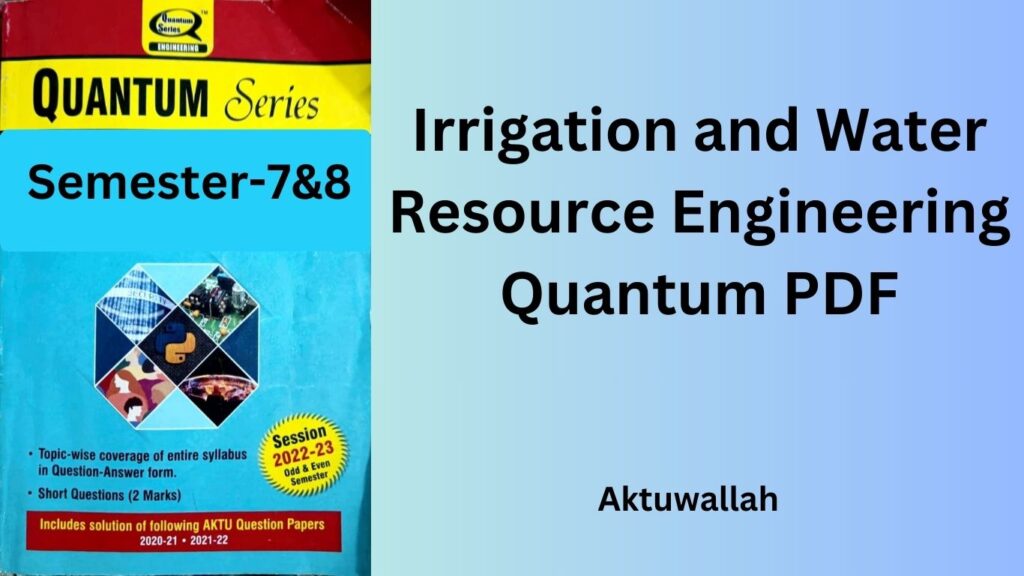Download Irrigation and Water Resource Engineering Quantum PDF For Civil Engineering Final Year:
In the realm of civil engineering, knowledge is power, and having access to the right resources can make all the difference. As a final-year civil engineering student, you’re likely in the process of preparing for your career or perhaps considering further studies. One invaluable resource you need at this juncture is a comprehensive guide which is Irrigation and Water Resource Engineering Quantum PDF. In this article, we’ll explore how you can download a PDF Quantum that will be your trusted companion in mastering this critical field of study.
How to download Irrigation and Water Resource Engineering Quantum PDF for free?
Just click on the given link to get your PDF file:
Download Now
Download other Civil Engineering quantum PDF for AKTU B-tech final year: Click Here
Download AKTU Syllabus of Civil Engg B-tech 4th year: Click Here
Download Civil Engineering Handwritten Notes: Click Here
Download IWRE PYQs: Click Here
Understanding Irrigation and Water Resource Engineering Quantum PDF:
What is Irrigation?
Irrigation is the artificial application of water to land or soil to assist in the growth of crops and vegetation. It plays a pivotal role in agriculture, helping to ensure food security worldwide. Proper irrigation techniques are essential to maximize crop yields while conserving water resources.
The Significance of Water Resource Engineering
Water resource engineering encompasses the planning, development, and management of water resources. It includes activities related to water supply, water quality, and the sustainable utilization of water for various purposes, such as drinking, agriculture, and industry.
Key Topics Covered in the Irrigation and Water Resource Engineering Quantum PDF:
To give you a glimpse of what to expect in the guide, here are some of the key topics it typically covers:
1. Hydrology
Hydrology is the science that deals with the distribution, movement, and quality of water on Earth. In the context of Irrigation and Water Resource Engineering, hydrology explores how precipitation, runoff, and groundwater interact. It’s essential for understanding the availability of water resources and managing them effectively.
2. Hydraulics
Hydraulics is the study of fluid behavior, particularly in confined environments. In this context, it involves the study of water flow in pipes, canals, and other hydraulic structures. Understanding hydraulics is crucial for designing irrigation systems, dams, and water distribution networks.
3. Irrigation Methods
Irrigation methods refer to the various techniques used to apply water to agricultural fields and landscapes. These methods can include surface irrigation, drip irrigation, sprinkler systems, and more. Each method has its advantages and limitations, and choosing the right one is vital for efficient water use.
4. Water Quality Management
Water quality management focuses on ensuring that water resources are safe and suitable for their intended use. It involves monitoring and controlling factors like contaminants, pH levels, and microbial content. Proper water quality management is essential for both human consumption and agricultural purposes.
5. Water Resource Planning
Water resource planning involves the strategic allocation and management of water for different purposes, such as agriculture, industry, and urban consumption. This process includes assessing water availability, setting priorities, and developing sustainable plans for resource utilization.
6. Environmental Considerations
Environmental considerations in Irrigation and Water Resource Engineering address the impact of water management on the ecosystem. It encompasses assessing and minimizing the environmental effects of irrigation practices, such as minimizing water wastage and preventing soil erosion.
7. Sustainable Water Use
Sustainable water use emphasizes the responsible and efficient utilization of water resources to meet current needs without compromising the ability of future generations to meet their needs. It involves optimizing irrigation techniques, reducing water waste, and promoting conservation.
8. Case Studies
Case studies provide real-world examples of successful (or sometimes unsuccessful) applications of irrigation and water resource engineering principles. They offer insights into practical challenges and solutions, helping students and professionals learn from past experiences.
Conclusion
As a final-year civil engineering student, your journey to becoming an expert in Irrigation and Water Resource Engineering starts with the right resources. Downloading Irrigation and Water Resource Engineering Quantum PDF can be a game-changer in your academic and professional pursuits. With the knowledge gained from this guide, you’ll be well-equipped to tackle real-world challenges in the field of civil engineering.